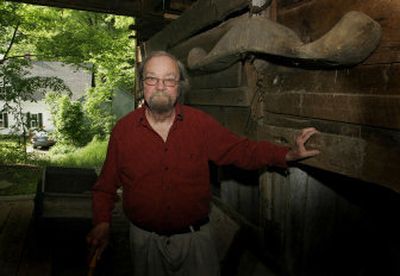N.H. wordsmith will be next U.S. poet laureate

WASHINGTON – Prize-winning New Hampshire poet Donald Hall will be the next poet laureate of the United States.
Librarian of Congress James H. Billington planned to announce the appointment today.
“Donald Hall is one of America’s most distinctive and respected literary figures,” Billington says in the prepared announcement. “For more than 50 years, he has written beautiful poetry on a wide variety of subjects that are often distinctly American and conveyed with passion.”
Hall’s selection to the one-year post is a “long-overdue recognition for one of America’s greatest and most-admired men of letters,” National Endowment for the Arts Chairman Dana Gioia says in the announcement.
Reached at home Tuesday afternoon, Hall said he received the news by fax last week.
“I feel grateful and excited and a bit frantic,” he said.
Born in Connecticut in 1928, Hall for the last 30 years has lived on an old family farm in the tiny west-central New Hampshire town of Wilmot, in the house where his mother and grandmother were born.
The library noted that Hall has published 14 books of poetry since his first, “Exiles and Marriages,” in 1955. His most recent, “White Apples and the Taste of Stone,” came out this year, a selection of poems from 1946 to 2000.
The widower of poet Jane Kenyon, who died in 1995, Hall last year published a memoir of their marriage, “The Best Day the Worst Day.”
He has won the Lenore Marshall/Nation Award, the National Book Critics Circle Award, the Los Angeles Times Book Award and the Ruth Lilly Prize for Poetry.
Also a writer of prose and children’s books, Hall won the Caldecott Medal for his children’s work “Ox-Cart Man.”
He is a member of the Academy of Arts and Letters and has received two fellowships from the Guggenheim Foundation.
Succeeding Ted Kooser as poet laureate, Hall will assume his duties this fall. He is to speak at the Library of Congress National Book Festival poetry pavilion on Sept. 30 on the National Mall in Washington and open the library’s annual literary series in October with a reading of his work.
The library says it tries to keep official duties of its poet laureates to a minimum so they can work on their own projects.
Some have chaired literary conferences and festivals. Maxine Kumin in 1981-82 started a women’s series of poetry workshops, and Gwendolyn Brooks worked in 1985-86 to nurture an interest in poetry among elementary school children.
Poet laureates receive $35,000 for the year as well as a travel allowance.